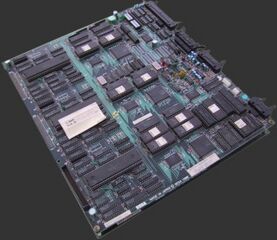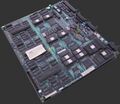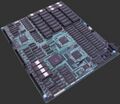Difference between revisions of "Sega Y Board"
From Sega Retro
| Line 17: | Line 17: | ||
==Technical Specifications== | ==Technical Specifications== | ||
* Board composition: CPU Board + Video Board | * Board composition: CPU Board + Video Board | ||
| − | * Main [[wikipedia:Central processing unit|CPU]]: 3× [[ | + | * Main [[wikipedia:Central processing unit|CPU]]: 3× [[Motorola 68000|MC68000]] @ 12.5 MHz (16-bit & 32-bit instructions @ 6.563 MIPS) |
** The first 68000 ("main" in MAME) has access to the sound hardware, I/O hardware, and 64KB RAM | ** The first 68000 ("main" in MAME) has access to the sound hardware, I/O hardware, and 64KB RAM | ||
** The second 68000 ("subx" in MAME) has access to the ysprites hardware, backup RAM and 16KB RAM | ** The second 68000 ("subx" in MAME) has access to the ysprites hardware, backup RAM and 16KB RAM | ||
** The third 68000 ("suby" in MAME) has access to the bsprites hardware, ysprites full plane rotation, bsprites palette RAM, and 64KB RAM | ** The third 68000 ("suby" in MAME) has access to the bsprites hardware, ysprites full plane rotation, bsprites palette RAM, and 64KB RAM | ||
** The three CPUs share 64KB of separate RAM for communication as well as the multiplier/divider hardware | ** The three CPUs share 64KB of separate RAM for communication as well as the multiplier/divider hardware | ||
| − | * Sound CPU: Z80 @ 4 MHz (8-bit & 16-bit instructions @ 0.58 MIPS) with 2KB RAM | + | * Sound CPU: [[Z80]] @ 4 MHz (8-bit & 16-bit instructions @ 0.58 MIPS) with 2KB RAM |
* [[wikipedia:Sound chip|Sound chip]]s: | * [[wikipedia:Sound chip|Sound chip]]s: | ||
** [[wikipedia:Frequency modulation synthesis|FM synthesis]] chip: [[Yamaha YM2151]] @ 4 MHz (8 FM channels) | ** [[wikipedia:Frequency modulation synthesis|FM synthesis]] chip: [[Yamaha YM2151]] @ 4 MHz (8 FM channels) | ||
| Line 29: | Line 29: | ||
** Graphics board: Sega 837-6566 Video Board @ 50 MHz (315-5196 sprite generator, 315-5213 sprite chip, 315-5242 color encoder, 315-5305 sprite generator, 2× 315-5306 video sync & rotation, 315-5312 video mixer) | ** Graphics board: Sega 837-6566 Video Board @ 50 MHz (315-5196 sprite generator, 315-5213 sprite chip, 315-5242 color encoder, 315-5305 sprite generator, 2× 315-5306 video sync & rotation, 315-5312 video mixer) | ||
** Math chips: 315-5248 hardware multiplier, 315-5249 hardware divider | ** Math chips: 315-5248 hardware multiplier, 315-5249 hardware divider | ||
| − | * [[ | + | * [[RAM]]: 812 [[wikipedia:Kibibyte|KB]] [[SRAM]] (Static RAM){{ref|https://github.com/mamedev/mame/blob/master/src/mame/drivers/segaybd.c}} |
** Main RAM: 208 KB (64 KB CPU 1, 16 KB CPU 2, 64 KB CPU 3, 64 KB shared) | ** Main RAM: 208 KB (64 KB CPU 1, 16 KB CPU 2, 64 KB CPU 3, 64 KB shared) | ||
| − | ** [[ | + | ** [[VRAM|Video RAM]]: 598 KB (64 KB Y-sprites, 4 KB B-sprites, 512 KB sprite [[wikipedia:Framebuffer|framebuffers]], 2 KB rotation, 16 KB palette) |
** Sound RAM: 6 KB (2 KB Z80, 4 KB SegaPCM) | ** Sound RAM: 6 KB (2 KB Z80, 4 KB SegaPCM) | ||
* [[wikipedia:Display resolution|Video resolution]]: 320×224 (display), 342×262 (overscan), progressive scan | * [[wikipedia:Display resolution|Video resolution]]: 320×224 (display), 342×262 (overscan), progressive scan | ||
| Line 48: | Line 48: | ||
** Y-sprite (back plane) layer: Plugs into a full-screen rotation, large [[wikipedia:Fillrate|fillrate]], dual [[wikipedia:Framebuffer|framebuffers]] (based on X Board) that can be fully rotated | ** Y-sprite (back plane) layer: Plugs into a full-screen rotation, large [[wikipedia:Fillrate|fillrate]], dual [[wikipedia:Framebuffer|framebuffers]] (based on X Board) that can be fully rotated | ||
** Sky gradient (background) layer: [[wikipedia:Bitmap|Bitmap]] plane | ** Sky gradient (background) layer: [[wikipedia:Bitmap|Bitmap]] plane | ||
| − | * [[ | + | * [[Sprite]]/texture capabilities: [[wikipedia:Linked list|Linked list]] of sprites, shadow & highlight, palette fade, color rotations, different levels of luminosity, full sprite zooming & scaling on both sprite planes, full sprite & framebuffer rotation on Y-sprite plane, [[wikipedia:Double buffering|double buffering]], dual line buffers on B-plane (512 sprite pixels/texels per line), dual [[wikipedia:Framebuffer|framebuffers]] on Y-plane |
** Sprite size/resolution: 8×8 to 512×512 [[wikipedia:Pixel|pixels]] | ** Sprite size/resolution: 8×8 to 512×512 [[wikipedia:Pixel|pixels]] | ||
** Colors per sprite/texture: 16 to 512 | ** Colors per sprite/texture: 16 to 512 | ||
Revision as of 07:59, 7 October 2015

| |||||
| Sega Y Board | |||||
|---|---|---|---|---|---|
| Manufacturer: Sega | |||||
|
The Sega Y Board is an arcade system board released by Sega in 1988 as a successor to the Sega X Board. Like the X Board before it, the Y Board was known for its 3D sprite/texture manipulation capabilities. It is the fourth in the Super Scaler series of arcade boards, after the Sega Hang-On hardware, Sega OutRun hardware and X Board.
The Y Board is quite different to the X Board in terms of design, offering a third CPU and more advanced video equipment. Most notably, the Y Board allows for real-time rotation of sprites as well as scaling, and has a higher fillrate for the sprites/textures. Unusually, the system uses no tile layers, so graphics are rendered using only sprites/textures (a design taken by SNK for their Neo-Geo hardware in 1990).
It was succeeded by the Sega System 32 in 1990.
Technical Specifications
- Board composition: CPU Board + Video Board
- Main CPU: 3× MC68000 @ 12.5 MHz (16-bit & 32-bit instructions @ 6.563 MIPS)
- The first 68000 ("main" in MAME) has access to the sound hardware, I/O hardware, and 64KB RAM
- The second 68000 ("subx" in MAME) has access to the ysprites hardware, backup RAM and 16KB RAM
- The third 68000 ("suby" in MAME) has access to the bsprites hardware, ysprites full plane rotation, bsprites palette RAM, and 64KB RAM
- The three CPUs share 64KB of separate RAM for communication as well as the multiplier/divider hardware
- Sound CPU: Z80 @ 4 MHz (8-bit & 16-bit instructions @ 0.58 MIPS) with 2KB RAM
- Sound chips:
- FM synthesis chip: Yamaha YM2151 @ 4 MHz (8 FM channels)
- PCM sampling chip: SegaPCM (315-5218) @ 4 MHz (stereo output, 16 PCM channels, 12-bit audio, 31.25 kHz sampling rate)
- GPU: Sega Super Scaler chipset
- Graphics board: Sega 837-6566 Video Board @ 50 MHz (315-5196 sprite generator, 315-5213 sprite chip, 315-5242 color encoder, 315-5305 sprite generator, 2× 315-5306 video sync & rotation, 315-5312 video mixer)
- Math chips: 315-5248 hardware multiplier, 315-5249 hardware divider
- RAM: 812 KB SRAM (Static RAM)[1]
- Main RAM: 208 KB (64 KB CPU 1, 16 KB CPU 2, 64 KB CPU 3, 64 KB shared)
- Video RAM: 598 KB (64 KB Y-sprites, 4 KB B-sprites, 512 KB sprite framebuffers, 2 KB rotation, 16 KB palette)
- Sound RAM: 6 KB (2 KB Z80, 4 KB SegaPCM)
- Video resolution: 320×224 (display), 342×262 (overscan), progressive scan
- Scanlines: 224 (display), 262 (overscan)
- Refresh rate: 59.6368 to 60 Hz (V-sync)
- Frame rate: 59.6368 to 60 frames per second
- Color palette: 2,097,152 (4096 palette banks with 512 colors each), to 16,777,216 with effects (shadow & highlight, luminosity, palette fade)
- Colors on screen: 24,576, to 71,680 (320×224) with luminosity and palette fade
- Video hardware:
- Two sprite planes with fixed Z-order
- Lower sprite plane ("ysprites" in MAME): full scaling and rotation; also the entire plane can be rotated as a whole
- Palettes are stored alongside the sprite table; sprite table entries hold a pointer to the palette, which itself is stored as an table of palette indirection values (?)
- Higher sprite plane ("bsprites" in MAME): standard Sega System 16B sprite plane
- Graphical planes: Three layers
- B-sprite (front plane) layer: Priority on top, based on System 16B (line buffer) sprite system
- Y-sprite (back plane) layer: Plugs into a full-screen rotation, large fillrate, dual framebuffers (based on X Board) that can be fully rotated
- Sky gradient (background) layer: Bitmap plane
- Sprite/texture capabilities: Linked list of sprites, shadow & highlight, palette fade, color rotations, different levels of luminosity, full sprite zooming & scaling on both sprite planes, full sprite & framebuffer rotation on Y-sprite plane, double buffering, dual line buffers on B-plane (512 sprite pixels/texels per line), dual framebuffers on Y-plane
- Sprite size/resolution: 8×8 to 512×512 pixels
- Colors per sprite/texture: 16 to 512
- Sprites/textures per frame: 68 KB RAM for B & Y sprites allows up to 2176 sprites/textures on screen (when they are 8x8 pixels size and 16 colors each)
- Sprites/textures per second: 129,769 (at 59.6368 Hz) to 130,560 (at 60 Hz)
- Video clock cycles: 50 MHz
- Fillrate: 50 million pixels/texels per second
- Sprite pixels/texels per frame: 833,333 (at 60 Hz) to 838,408 (at 59.6368 Hz)
- Sprite pixels/texels per scanline: 3180 to 3200
- Sprites/textures per scanline: 397 to 400
List of Games
- Galaxy Force (1988)
- Galaxy Force II (1988)
- Power Drift (1988)
- G-LOC Air Battle (1990)
- Rail Chase (1991)
- Strike Fighter (1991)
Gallery
| Sega arcade boards |
|---|
| Originating in arcades |
|
77
78
79
80
81
82
83
84
85
86
87
88
89
90
91
92
93
94
95
96
97
98
99
|
| Console-based hardware |
|
84
85
86
87
88
89
90
91
92
93
94
95
96
97
98
99
00
01
02
03
04
05
06
07
08
09
10
11
12
13
14
|
| PC-based hardware |
|
05
06
07
08
09
10
11
12
13
14
15
16
17
18
19
20
21
22
23
|

